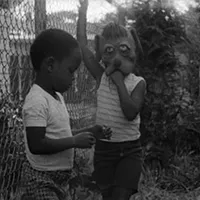

In director Alex Gibney's Taxi to the Dark Side, the recent winner of the Academy Award for Best Documentary Feature, Dilawar is the kind of man lost in the Big Man school of history dominated by the Colin Powells and Donald Rumsfelds. A slight, boyish Afghani taxi driver with a wife and small child, Dilawar was unlucky enough to wind up in the crosshairs of the American roundup of suspected terrorists in Afghanistan. He was taken to Bagram air base in 2002. His family never saw him alive again.
Though he may have been a "nobody," Dilawar's death illuminates one of the great tragedies of America's war on terror: that real, often innocent, flesh-and-blood people's lives are snuffed out by Big Man policies. Gibney takes a prolonged and circuitous route in making his point: that one man's death can be symbolic, and illuminate what vague, ambiguous policy seeks to hide.
Dilawar became the subject of a New York Times exposé of the disturbing American turn to torture during the war on terror. And in startling testimony captured in Taxi to the Dark Side, American soldiers attest to the unrelenting sadism to which they subjected the most likely innocent Dilawar. His death was ruled a homicide, and it joined a sickeningly widespread litany of other abuses unearthed at Bagram, Guantanamo Bay and Abu Ghraib.
Gibney's 2005 Oscar-nominated documentary, Enron: The Smartest Guys in the Room, exposed institutionalized bad behavior at that infamous Texas energy company. And Taxi to the Dark Side deals with similar issues of abused power, tangled bureaucracy and how little guys often suffer the most for the crimes of the big boys. Gibney's scrupulously detailed film looks at how a Bush administration hostile to the Geneva Conventions created the opportunity for bad behavior in Iraq and Afghanistan.
The film often relies on administration insiders and "company men" from the FBI to top military officials, even Navy counsel Alberto Mora, who speak out against the use of torture in Afghanistan, Iraq and Guantanamo. Especially disturbing is footage of U.S. Sen. and Republican presidential candidate John McCain during his nearly six-year imprisonment and torture in Vietnam. That grainy black-and-white footage of a clearly distraught McCain is coupled with the senator's clarity about arming America's soldiers with unambiguous anti-torture guidelines: "Give them clear standards of conduct that reflect the ideals that they risk their lives for."
But Gibney saves the final word for another representative "little" man, his father and former World War II Navy interrogator Frank Gibney. Defying the sensationalist American culture of the TV show 24 where, according to one torture academic interviewed in the film, terror is entertainment, Frank Gibney remembers a time when America's morality was assured even in times of war: "It was what made America different."
To see trailers of the five Oscar nominees for Best Documentary Feature, go to www.theclogblog.com.
Docs spotted in the Q.C.
When it comes to the topic of Oscar-nominated documentaries, an 80 percent achievement rate isn't bad at all.
Indeed, of the five films nominated by the Academy this year for Best Documentary Feature, four have played or will play at a Charlotte movie theater. That's an admirable amount of visibility as well as a far cry from past years, when nonfiction features were even rarer in the Queen City than snowfalls that stick.
Thanks to the increasing popularity of documentaries, the previous five years provided a template on which to build: In each of these years, three of the five nominated pictures played locally. But before that, we'd be lucky to get more than one of the honored films, and some years found us receiving zilch.
This time around, however, we've been amply rewarded. Taxi to the Dark Side (which took the Oscar against strong competition) opens this Friday; Sicko and No End In Sight played last July and September respectively; and War/Dance opens March 21 at Ballantyne Village Theatre. The only no-show at this point is Operation Homecoming: Writing the Wartime Experience. And let's not forget the handful of non-nominees that played here in 2007, among them The King of Kong: A Fistful of Quarters, A Man Named Pearl and In the Shadow of the Moon.
So might we go five-for-five next year? The odds are only increasing.
– Matt Brunson
Top 10 Moneymaking Documentaries
1. Fahrenheit 9/11 (2004) -- $119.1 million
2. March of the Penguins (2005) -- $77.4 million
3. Sicko (2007) -- $24.5 million
4. An Inconvenient Truth (2006) -- $24.1 million
5. Bowling For Columbine (2002) -- $21.5 million
6. Madonna: Truth Or Dare (1991) -- $15.0 million
7. Winged Migration (2003) -- $11.6 million
8. Super Size Me (2004) -- $11.5 million
9. Mad Hot Ballroom (2005) -- $8.1 million
10. Hoop Dreams (1994) -- $7.8 million
Source: www.boxofficemojo.com


